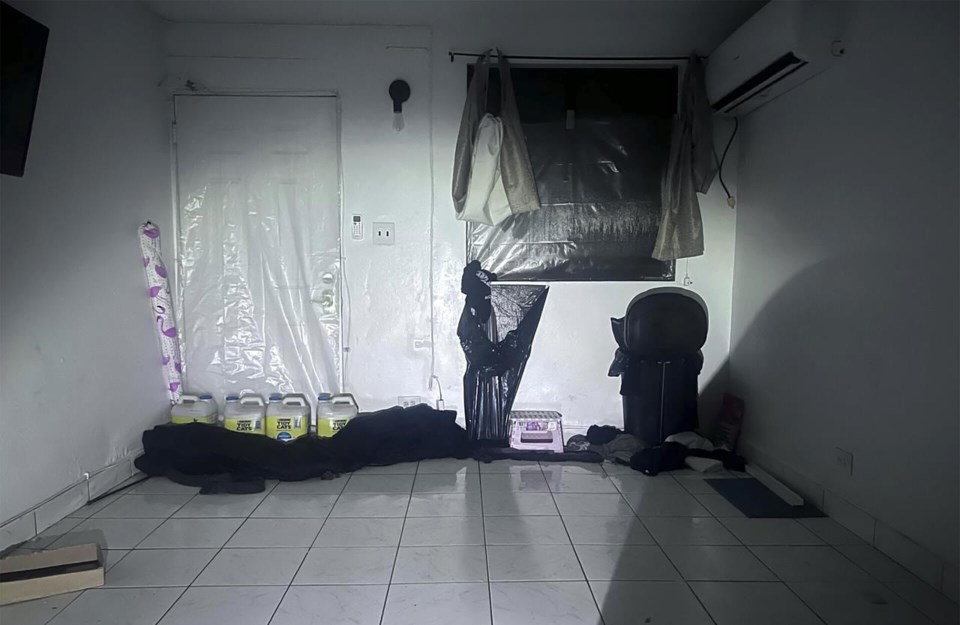HAGATNA, Guam (AP) — Chainsaws buzzed Friday as neighbors helped neighbors clear toppled trees and began cleaning the wreckage of Typhoon Mawar, which walloped Guam as the strongest typhoon to hit the island in over two decades but appeared to have passed without leaving death or massive destruction in its wake.
While it was still early going in the recovery effort, police Sgt. Paul Tapao said there did not seem to be any major damage, main roads were passable and “Guam has been very blessed to have no storm-related deaths or any serious injuries.”
To Tapao, the roar of the mechanical saws was a reminder of the resilience of the storm-prone U.S. Pacific territory and its people.
“Everyone helps out with the cleaning,” he said. “That’s the Guamanian way — that’s embedded in the blood.”
He added that there's a saying in Chamorro — the indigenous language of the Mariana Islands — “inafa maolek,” that means cooperation, a concept of restoring harmony or order.
“Storms have taught our island to be resilient,” he said. “We’re still here.”
Still, officials said it could take weeks to clean up the mess after Mawar briefly made landfall as a Category 4 storm Wednesday night on the northern tip of the island of roughly 150,000 people, flipping cars, tearing off roofs and leaving trees bare.
Some villages had little or no water Friday, Tapao said. About 51,000 customers were without electricity, according to the Federal Emergency Management Agency. There were 725 people in shelters Friday, down from nearly 1,000 on Thursday, officials said.
Water contamination from the heavy rains and runoff was a concern: The Guam Waterworks Authority issued a notice advising residents to boil water before drinking it, and the Guam Environmental Protection Agency warned people to stay out of the sea at all beaches because of high bacteria content.
The central and northern parts of the island received more than 2 feet (60 centimeters) of rain as the eyewall passed. The swirling typhoon churned up a storm surge and waves that crashed through coastal reefs and swamped houses.
In the southeastern village of Yona, the floodwaters reached above the waist at the home where Alexander Ken M. Aflague's mother-in-law and sister-in-law live, he said. Two trucks and an SUV were completely submerged.
Aflague said the mood on the island was like after every storm, as people assess the damage and move toward rebuilding their lives back to normal. His major worry was shortages, saying supplies were at levels similar to what they were during the early days of the COVID-19 pandemic.
“The cleanup is the struggle but we all pitch in and help each other,” he said via text message.
Also in Yona, winds peeled back the roof of Enrique Baza’s mother’s house, allowing water to damage everything inside. His mother rode out the storm with him at his concrete residence, he said, but “my mom’s house didn’t escape.”
He drove around in a pickup after the storm passed looking for supplies to repair her roof, but most stores were without power and accepting only cash. Many wooden or tin homes were badly damaged or had collapsed outright.
“It’s kind of a shock,” Baza said.
On Friday, President Joe Biden declared that a major disaster exists for Guam and ordered federal aid to supplement recovery efforts.
There were long lines at ATMs and some stores and gas stations on Friday.
Officials said they anticipated being able to resume operations at the flooded A.B. Won Pat International Airport next Tuesday.
Guam Gov. Lou Leon Guerrero gave the all-clear Thursday evening, returning the island to its typical condition of readiness as the National Weather Service lifted its typhoon watch.
“We have weathered the storm,” Leon Guerrero said.
The storm is forecast to continue moving northwest before turning sharply north Tuesday or Wednesday, according to Taiwan’s Central Weather Bureau. That track would keep the typhoon at sea for days as it gradually weakens.
Mawar had regained its status as a super typhoon on Thursday, with winds reaching 150 mph (241 kph). By early Friday, they had strengthened to 175 mph (282 kph), according to the weather service.
On Friday morning, Mawar was centered 345 miles (555 kilometers) west-northwest of Guam and 360 miles (579 kilometers) west of Rota, Guam’s neighbor to the north, moving west-northwest at 14 mph (23 kph).
Carlo Quinonez, who lives near Tamuning, said he rode out the storm in a hotel and felt “very lucky” that the building was largely unscathed. A nearby abandoned building lost many of its windows and part of a wall on the fifth story, Quinonez said.
“It was the peak that had us questioning our safety. Floors rattling and walls creaking. Tossing debris, and roots, and fruit everywhere,” he wrote in an email.
The Navy has ordered the USS Nimitz aircraft carrier strike group to head to the island to assist in the recovery effort, according to a U.S. official. The Nimitz, along with the USS Bunker Hill, a cruiser, and the USS Wayne E. Meyer, a destroyer, were south of Japan and expected to arrive in Guam in three or four days, said the official, who spoke on condition of anonymity to discuss ship movements not yet made public.
___
Kelleher reported from Honolulu. AP Science Writer Seth Borenstein in Kensington, Maryland, and Associated Press writers Lolita C. Baldor and Sarah Brumfield in Washington, Audrey McAvoy in Honolulu, Mark Thiessen in Anchorage, Alaska, Stefanie Dazio in Los Angeles, Ed Komenda in Seattle and Rebecca Boone in Boise, Idaho, contributed.
Grace Garces Bordallo And Jennifer Sinco Kelleher, The Associated Press



